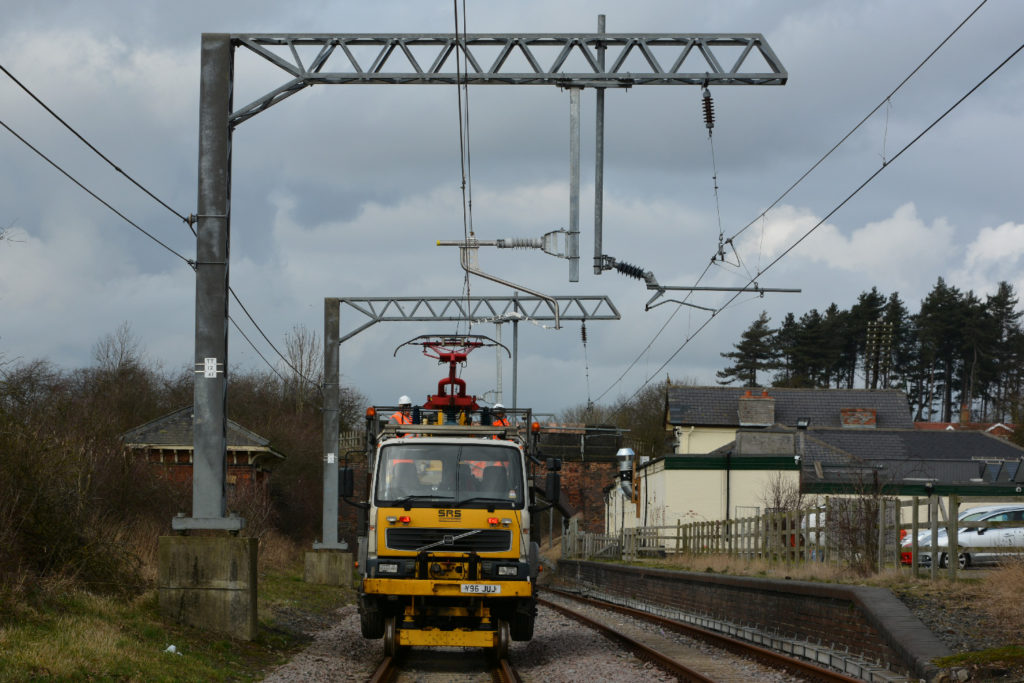The UK railway industry has been much criticised for the excessive cost of its electrification projects. Of course, not all projects run over budget, and sometimes, even then, the overrun has been caused by factors outside of the industry’s direct control. However, the criticism has focussed minds and resulted in several industry initiatives. One was the Railway Industry Association’s Electrification Cost Challenge Report.
Another was a pair of research projects promoted by the University of Sheffield, Furrer+Frey and Network Rail. After four years, two PhDs have been completed, both focusing on different areas of cost-efficient electrification and improved reliability.
The University of Sheffield, Furrer+Frey and Network Rail are all members of the UK Rail Research and Innovation Network (UKRRIN). The research demonstrates that collaboration between universities and industry can play a vital role in bringing innovation to Britain’s railway. Ultimately, the work shows how engineering research can help underpin electrification of the UK’s rail network, driving innovation and improving service reliability for passengers.
The two pieces of research, undertaken by Sam Hayes and Özgün Sunar from the University’s Department of Mechanical Engineering, were both supported by Furrer+Frey and Network Rail to focus on cost-efficient electrification of the UK rail network. They were jointly funded by the University of Sheffield, Furrer+Frey and the European Union, as part of programmes to improve research collaboration with the railway industry.
Professor David Fletcher, head of the research group at Sheffield, said: “The engagement with Furrer+Frey has been really great in funding and steering these research projects. Their expertise has ensured the research stayed focused on industry needs, ensuring impact from the academic input of our PhD students.”
Wind, speed and slope
The first PhD, undertaken by Sam Haye with the support of Prof David Fletcher and Furrer+Frey’s Katherine Chan, examined the effect of wind, train speed and gradient with the aim of avoiding the need for bridge reconstruction on future electrification projects.
Bridge reconstruction has been a key driver in increasing electrification costs, so reducing the need for these reconstructions is key to reducing costs, as highlighted in RIA’s Electrification Cost Challenge.
Performance of the wires was recorded, using both large-scale wind tunnels and computational fluid dynamics, to create a digital twin of wiring geometry. This digital twin was then validated with real-world testing at Network Rail’s Rail Innovation and Development Centre (RIDC) test track at Old Dalby, near Melton Mowbray in Leicestershire.
The researcher looked at the maintenance impact of steeper gradients in order to determine whether the need to reconstruct bridges could be avoided in future.
Engineering director at Furrer+Frey, Rob Daffern, said: “I studied at The University of Sheffield, so to be working with cutting edge research back at Sheffield has been tremendous. The whole industry is focused on reducing costs and research is key.”
Improving reliability
The second PhD project was undertaken by Özgün Sunar, with the support of Prof David Fletcher and industrial supervision by Chris Bryan of HS2. The focus of this research was to improve the reliability of overhead line electrification equipment, when short-circuits and arcing occur.
The research used both modelling and mechanical/electrical testing to establish intervention points and understand when maintenance is needed, prior to service-interrupting failures. The research also trialled innovative new conductor materials.
The ultimate aim was to improve the performance of electrification and enhance reliability by preventing failures.
Director of Furrer+Frey Noel Dolphin said: “We’re proud to be supporting decarbonisation through electrification. Research and study are one of the keys to making electrification cost efficient.
“However, as the Railway Industry Association’s Electrification Cost Challenge Report has shown, we need to remember that implementing a rolling programme of electrification would have the biggest impact on costs. By reducing costs and improving reliability, we make this business case stronger.”
Dr Patric Mak, senior engineer for Network Rail’s Technical Authority, said: “It’s really important for Network Rail and the wider rail industry to continue to look for ways to bring innovation to Britain’s railways and at how we can address new challenges, such as more extreme weather.
“On behalf of Network Rail, I’ve been delighted to support both of these PhD students with their research, which will help us to create a more modern and resilient railway, meaning fewer delays for both passenger and freight service.”
Demonstrating cost-efficient electrification has been a key component of moving away from boom-and-bust infrastructure building. The railway industry has called for a rolling programme of electrification.
Electrification is the most efficient method of traction power for railways, Specifically, electrified railways:
Are better for the environment, with carbon emissions 60 per cent lower than diesel trains today, increasing to 80 per cent less when using the estimated 2040 grid mix, and are the only option for decarbonising intensively used lines;
Produce no air pollutants at the point of use;
Are quieter, reducing noise pollution for those living and working near the tracks and reducing noise and vibration for passengers;
Have a strong economic and business case – compared with diesels, electric trains cost less in the long term, when compared to the whole-life costs of diesel services, are cheaper to build, more reliable, requiring less maintenance, and are cheaper to operate and longer-lasting;
Are lighter weight, meaning less wear to the track and therefore less maintenance, and carry more passengers with better acceleration and shorter journey times, even with relatively frequent stops;
Reduce passenger delays, as electric trains are more reliable than diesel trains;
Will be vital in decarbonising rail freight, which is already a low-carbon mode of haulage and delivers benefits in excess of £1.7 billion each year to the economy.
Joint academic research, in collaboration with industry, could be key in delivering future cost-efficient electrification and a reliable railway.


